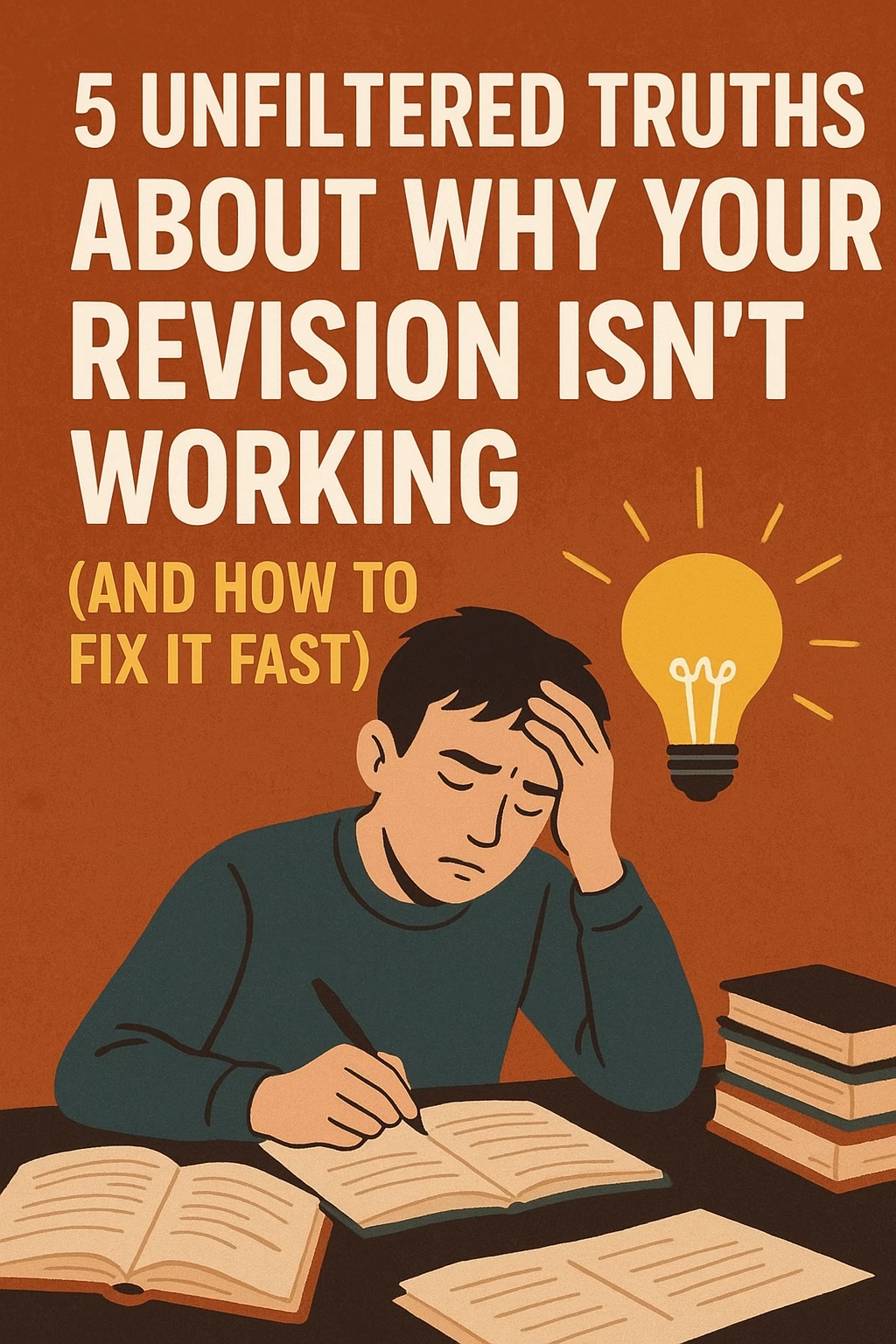5 Unfiltered Truths About Why Your Revision Isn’t Working (And How to Fix It Fast)- Detailed Guidance

5 Unfiltered Truths About Why Your Revision Isn’t Working
Let’s be brutally honest.
Every CA student says, “I’ve started revision,” but most don’t actually revise — they just re-read. You go through the same notes again, underline a few lines, and convince yourself you’re revising.
But when it’s time to write a mock test or explain a concept, your mind goes blank.
That’s not lack of effort — it’s a broken revision system.
Let’s fix that today.
Here are 5 Unfiltered Truths About Why Your Revision Isn’t Working — and exactly how to make it work right now.
5 Unfiltered Truths About Why Your Revision Isn’t Working:
1. You’re Re-Reading Instead of Actively Recalling
The Truth:
Simply reading or highlighting text is passive learning. It tricks your brain into feeling like you know the topic — when in reality, you’re only familiar with it, not fluent in it.
The Fix:
Switch to active recall. After finishing a topic, shut your notes and try to explain it aloud, or write down key points from memory.
Ask yourself:
- Can I explain this to a friend without looking?
- Can I solve a similar question without referring?
- What’s the logic behind this answer?
This small change transforms your revision from reading to remembering.
2. You’re Trying to Revise Everything in One Go
The Truth:
Most students plan one giant “revision month” before exams — which never works. The CA syllabus is simply too vast. You’ll forget older topics while rushing through new ones.
The Fix:
Revise in layers — that’s how toppers do it.
- 1st Round: Concept clarity — understand everything, mark weak areas.
- 2nd Round: Practice — questions, RTPs, and past papers.
- 3rd Round: Superfast recall — notes, keywords, and tests.
Spacing your revisions builds memory. Your brain remembers better when you revisit information after gaps — not all at once.
3. Your Notes Aren’t Built for Speed
The Truth:
If your “revision” still involves opening full-length books or detailed class notes, you’re wasting precious hours. You won’t be able to revise such bulky material during the final days.
The Fix:
Create revision-friendly notes:
- One-page summaries for each topic.
- Keywords, formulas, and mnemonics.
- Color codes or sticky tabs for quick recall.
Pro tip: Use the 3-second rule — during final revision, you should be able to understand a page within 3 seconds of glancing at it.
4. You’re Ignoring Mock Tests and Real Practice
The Truth:
Fear of bad marks stops many students from attempting mocks — but that’s like skipping practice because you’re scared to miss a goal.
Mocks don’t expose your weakness to others — they expose it to you. And that’s priceless.
The Fix:
Take at least one mock every 10–12 days.
Simulate the real exam — same timing, same rules. Evaluate answers honestly.
You’ll learn:
- How well you manage time.
- Where your writing presentation fails.
- Which chapters crumble under pressure.
Every mock test is one layer of armor added before battle.
5. You Don’t Have a Structured Plan
The Truth:
Random revision equals random results. “I’ll revise what I feel like” is the fastest route to burnout and guilt. Without structure, you’ll always feel you’re missing something.
The Fix:
Plan your revision like a project:
- Split subjects into topics.
- Assign days and targets.
- Keep 10–15% buffer time for delays.
Use a revision tracker — paper, spreadsheet, or app. Seeing your progress daily gives motivation and direction.
Bonus Truth: You’re Not Reviewing Mistakes
The Truth:
Revising isn’t just about studying again — it’s about learning from your errors. If you don’t note down where you go wrong, you’ll keep repeating the same mistakes in every test.
The Fix:
Maintain a “Mistake Book.”
Every time you slip — conceptually or in presentation — note it down in one place. Revise that before the next test. Over time, your weak areas shrink, and your confidence grows.
Final Takeaway-5 Unfiltered Truths About Why Your Revision Isn’t Working
Your revision isn’t failing because you’re lazy — it’s failing because your system is.
Once you switch from passive to active, from random to structured, and from fear to feedback, you’ll see real results.
Remember:
- Don’t just read — recall.
- Don’t just cover — consolidate.
- Don’t just hope — plan.
Do this, and your revision will finally start delivering what you’ve worked so hard for — marks, confidence, and peace of mind.
FAQs on “5 Unfiltered Truths About Why Your Revision Isn’t Working”
1. Why isn’t my CA revision working even after long hours?
Truths About Why Your Revision Isn’t Working ,Because you’re likely re-reading instead of recalling. Revision must test your memory — use active recall and mock questions to make every hour count.
2. How many times should I revise before CA exams?
At least three times — first for concepts, second for practice, and third for quick recall with mock tests.
3. How can I make my CA revision notes effective?
Keep them short and visual. One topic per page, using keywords, formulas, and flowcharts — not long paragraphs.
4. Should I give mock tests during revision?
Yes! Attempt one every 10–12 days. Mocks reveal weak areas, improve speed, and reduce exam fear.
5. What’s the biggest mistake CA students make in revision?– Truths About Why Your Revision Isn’t Working
Depending only on reading. Real learning happens when you test yourself without looking at notes.
🔗 Join 10,000+ CA Students using our Test Series to study smarter and create your own academic brand. Structured tests with detailed feedback.
